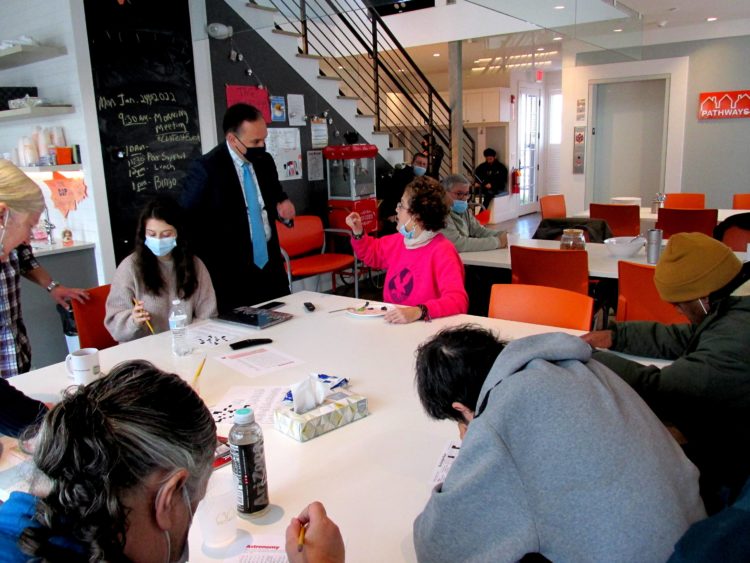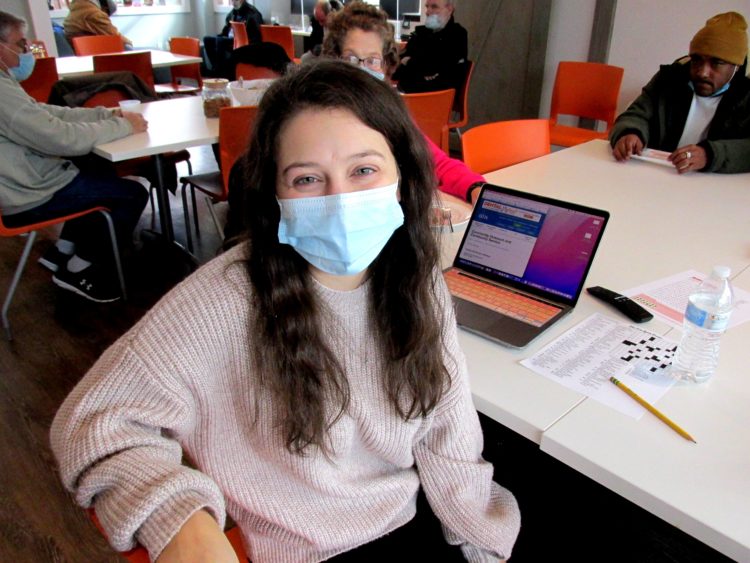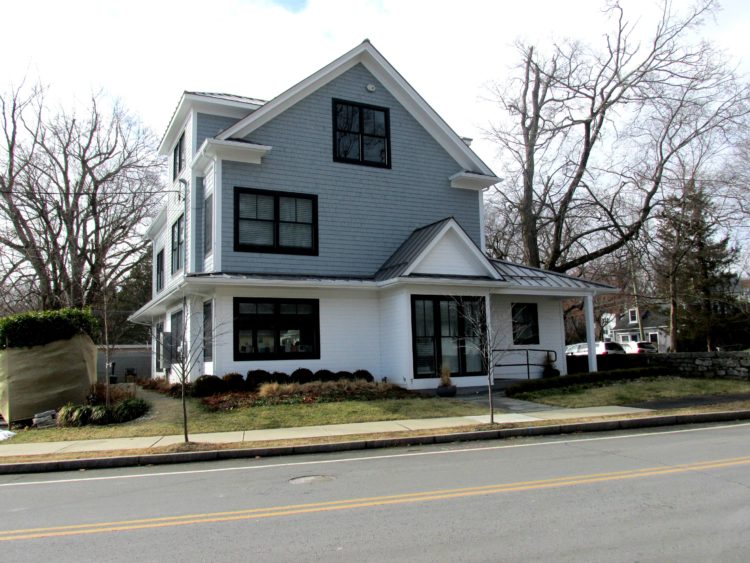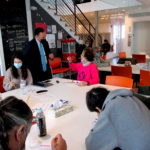Peter Tesei takes on Pathways, a success story of support for our vulnerable population

By Anne W. Semmes
Since last November Peter Tesei, who served a record six-terms as First Selectman of Greenwich, has taken on the mantle of executive director of Pathways, and is thriving. “I love people,” says Tesei, “and Pathways is a people organization. Its mission is to provide housing and support services to people living with prolonged mental illness and these are people who are vulnerable and need support.”
In his early days as a bank officer with Putnam Trust and BNY/Mellon Tesei had served Pathways and been aware of the challenges it faced in establishing its first group residential home on Davis Avenue. “Pathways has a wonderful history,” he tells. “It’s been a challenge each time they’ve come forward to provide additional housing.”
Today, there are four group residences across town able to serve up to 40 individuals who suffer from schizophrenia, bipolar disorder, major depression, ages 20’s to 70’s. And in those four group homes that have various levels of professional care and housing – Davis Avenue, 175 Milbank Avenue, 509 East Putnam, and 50 Brookside Drive – Pathway clients are demonstrating they are able to progress in their mental health.
Tesei gives an example of one of those clients, Bert Gates who recently died. “He passed sadly at the age of 64 and had been a resident of the Pathway homes for a number of years.” In those years Gates had “become independent enough to live on his own at Quarry Knoll. He had his own apartment. And he would come to the Pathway Fellowship Club. So, he’s really the face of the Pathways program and its success. And not everybody is going to be able to do that. But I point him out because his family was so thankful to Pathways for being there for him.”
That Pathway Fellowship Club has a new name it has earned, The Success Club, where the Pathway clients meet daily in Pathway’s brightly rebuilt building opposite the Cos Cob Library on Sinawoy Road. Tesei took this reporter there after a tour of the Pathway houses.
Touring the Pathway properties
Outside the red brick Davis Avenue home, Tesei told of the struggle that Pathways founder Renee Bigler had in procuring that first house back in 1981. “Renee’s story is one of inspiration. She has a son who has been afflicted with mental illness and recognized that there was no place for these folks to go. And so, she took up the cause with a number of other dedicated people.”
In fact, Pathways’ board is well represented by families having a family member with mental illness. “There’s been a deep and abiding commitment,” tells Tesei, “on the part of these half a dozen or so families to this organization, which I think is remarkable.” He adds, “And we are looking to attract new people to the board…medical professionals both in general medicine and psychiatry. An attorney would be helpful to us because we are a human resource dependent organization and having that background would be helpful as we have a lot of varying categories of employment.”
We arrive at 509 East Putnam and Brookridge Drive. It’s a light filled house with 10 clients in 10 studio apartments. The kitchen is expansive brightened with a Picasso flower print. A female client smiles as we enter, sitting by a large fish tank. “We have a fish tank in each of our houses,” notes Tesei.
Establishing this 509 East Putnam residence took nearly 10 years he tells. “It was opposed by the neighbors here on Brookridge, and they went to court…Pathways prevailed.”
We step into the living room, with its dark wood paneling. “It reminds me of an old inn,” says Tesei. But he sees the apartments in this residence, as well as those in Davis and Midland residences, needing to be “better organized and uplifting since the clients spend time in their personal space.”

A look into Pathways’ Success Club
The Success Club is our next stop. Its late morning and numerous clients have gathered for fellowship and recreation. We enter from the back patio, meeting up with Pathways’ new Clinical Director Alessandra Pane whose important job is to determine which clients referred by Connecticut DMHAS (Department of Mental Health and Addiction Services) would be best fits at Pathways. Along with the nearly 40 Pathways residential clients, there are 41 community clients who live elsewhere but depend on the Success Club to fill their days.
We step into the Success Club, joining clients sitting around tables sipping coffee, chatting, others sit before computers, others move about. The rich aroma of lasagna drifts in from the adjoining kitchen. Tesei is warmly welcomed by many – and everyone is masked.
“They’ve remarkably come through the pandemic,” shares Tesei in an aside, “Without any resident becoming positive, which is a tremendous achievement given the gravity of this situation. Kudos should go to the residential staff.” Though soon after Tesei arrived in November, Omicron did claim one client. “We treated it very seriously,” he adds.
There’s an influx of more clients arriving with Activities Coordinator Lauren Curcio. “We just got back from the YMCA,” she tells. “We had Aqua Fit which is like free swim. And right now, a client led peer support is meeting upstairs while we are preparing lunch.” Then its Bingo, and belated birthday cake baking for a client.
(Curcio later shared the extraordinary “rich histories” she’s learning from her clients. “One of the clients studied anthropology and archaeology and went on to give a speech at the Museum of Natural History. Another spent time in Alaska helping to build infrastructure for Native Americans.”)
The day’s lunch menu is lasagna, garlic bread and salad overseen by the program director of the Success Club, Anne Warren. She offers some garlic bread made by clients, with a quip, “We like to keep it light but today’s a carb day.” Tesei, overhearing, says he’s happy to see salad and fruit salad on the menu.
It’s Warren’s third week being with her Pathways clients, but she feels she’s known them “much longer. They are such a sweet group of people. I am happy to be here every day with them.”
Tom Athan shares his brother Alex Athan’s success
Pathways board chair Tom Athan arrives and Tesei suggests we go up to the third floor to chat. We pass the client led peer support group meeting. The client leader is Tom Athan’s younger brother Alex who, having arrived six years ago, is another Pathways success story. “I’ve seen him just become happier. His head’s up more, he smiles more, he’s way more confident in everything he does.”
Alex had come to Pathways from the New York mental health system, tells Athan. Citing “the differences in the organizations and the way they’re run,” he says that before his brother had felt he was “always a number,” but at Pathways he says, “I’m Alex.” He sees his brother now wanting to “be a part of society, as opposed to just being by himself. And he has friends here, and the staff people he respects.”
Seeing his brother develop pulled this entrepreneur with years spent on Wall Street into supporting Pathways as well. “It was founded out of love – a mother’s love for a child,” Athan tells. “Renee Bigler wanted to give her child the best care. And it evolved over the years from one person in one house to multiple in multiple houses to an organization that is professional, and has goals and missions, and a board. And what I’ve seen since is it evolves professionally every day.
“We’re not a big organization,” he continues. “We’re still very much driven by grassroots friends and family. We have a savings account for rainy days, and for things that we can add to the clinic care of our clients, but we would really love some corporate donations and some corporate support. We have some, but we could definitely use more because there’s so many people in need. There’s waiting lists to get in here. We’d like to help as many people as we can.”
Peter Tesei seeing the needs of his Pathway clients
Athan then puts his focus on Tesei. “Peter has had a different role in his career. But when the board found him – and he really wanted to give back to the community as he had been doing and take on a different role – it was a perfect match. He is very compassionate, and he’s a good people person.”
“Pathways is a family,” responds Tesei. “It’s really an extended family. I like coming here because I was invited into this big family.”
“We’re the right size right now, says Athan. “Everybody has a name; everybody knows each other still. And all the people know Peter. If we were 1000 people in 100 houses, it would be different. So, we don’t have any big plans to double or triple. We want to continue to keep up the care we have.” But he touches on, “For people with mental health issues, and our aging population, there’s not a lot of places for people to go as they age out of these types of living facilities.” So, perhaps, he adds, there’s a need to “come up with a way to take care of our members or clients as they get older.”
But Tesei is focused on the now, that upgrading of clients’ rooms, perhaps involving them in choosing a “type of soothing color paint,” as he did for himself in his 175 Milbank office, laying on a “soothing” dark blue paint. He sees, “Ergonomically there needs to be a desk to engage clients with a sort of external, internal order.” But perhaps, more importantly there’s that plumbing problem. “Toilets take a heavy use here, in part because of the nature of the medications that people take.” It was time he believes to “move toward a more industrialized toilet so that we’re not constantly having to call in plumbers.”
Every aspect of his clients’ lives is on his mind, such as their diet. He’d tuned into a talk by the National Alliance for Mental Illness (NAMI) on “how diet and gut health impact brain health.” He’d learned how “overindulgence of sugar, gluten, certain foods exacerbate certain mental conditions.” So, he’s put healthy eating on the front burner.
Then there’s that need for walking. Wouldn’t it be great he thought, “to do like a whole itinerary [for his clients] where we could choose the parks in the region, and change the venue, Cos Cob Park, Binny Park, Tod’s Point.”
Then there’s job training with a few clients having found work in Whole Foods and Stop & Shop. “We have one gentleman,” Tesei adds, “who works at a kennel up in backcountry Greenwich. Working with animals is so healing.” What about gardening he’s asked. “That’s a very good idea. Several of the clients like gardening, particularly several of the women.”
Some of those ideas for his clients will cost money, so Tesei’s mind in also on the need to find financial support. So, he’s looking forward to the upcoming Pathways March 4 benefit at the Capitol Theater in Port Chester featuring the Marcus King Band, with a certain percentage of those $200 tickets going to Pathways.
And then there’s that need to how to best transport his clients about town. “We’re going to acquire two more Toyota Sienna certified pre-owned minivans with the idea that we can transport our clients ourselves,” he tells, “Right now we are relying on the good graces of TAG and the bus picks them up. But we have to look at our overall business plan and how we can frankly economize.” Tesei appears fully engaged in meeting the needs of his extended Pathways family.

Pathways










